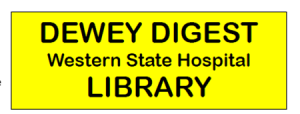 Dear Dewey from Western State Hospital has a new name…Dewey Digest and a new format. Check out the latest issue, “Dog Days of Summer.”
Dear Dewey from Western State Hospital has a new name…Dewey Digest and a new format. Check out the latest issue, “Dog Days of Summer.”
Tuesday, July 16th, 2013 Posted in Articles, Institutional Library Services | Comments Off on Dear Dewey has a New Name
 Dear Dewey from Western State Hospital has a new name…Dewey Digest and a new format. Check out the latest issue, “Dog Days of Summer.”
Dear Dewey from Western State Hospital has a new name…Dewey Digest and a new format. Check out the latest issue, “Dog Days of Summer.”
Wednesday, March 13th, 2013 Posted in Articles, Institutional Library Services, Uncategorized | Comments Off on March Issue of Western State Hospital Library Newsletter Salutes Kim Wyman
Tuesday, January 22nd, 2013 Posted in Articles, Institutional Library Services, Uncategorized | Comments Off on Dear Dewey from WSH February 2013

Latest isssue now available, check it out here. Dear Dewey February 2013
Thursday, January 10th, 2013 Posted in Articles, Digital Collections, For the Public, Random News from the Newspapers on Microfilm Collection, State Library Collections | Comments Off on Coffee-O the Alchemist
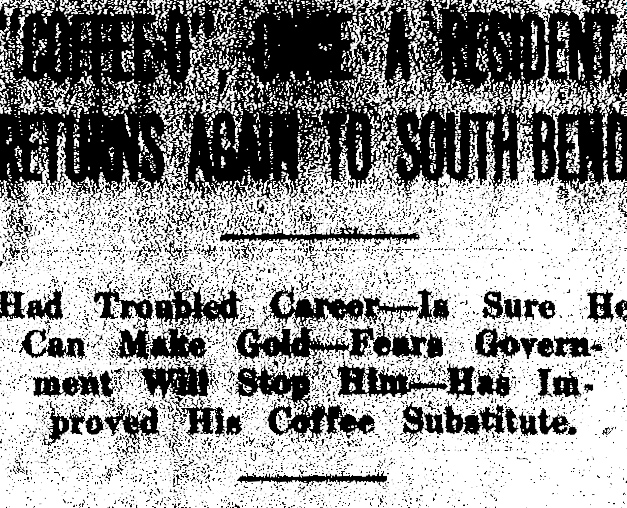 From the desk of Steve Willis, Central Library Services Program Manager of the Washington State Library:
From the desk of Steve Willis, Central Library Services Program Manager of the Washington State Library:
The random reel for this week contained the following article from the Dec. 17, 1920 issue of the South Bend Journal:
“COFFEE-O”, ONCE A RESIDENT, RETURNS AGAIN TO SOUTH BEND
Had Troubled Career — Is Sure He Can Make Gold — Fears Government Will Stop Him — Has Improved His Coffee Substitute.
“After over two years absence Albert Cornell, better known as ‘Coffee-O’ after a coffee substitute he invented, arrived in the city looking prosperous and more confident than ever that he had discovered the method of making gold by the combination of certain gases. It may be remembered that he came here first and opened a dyeing establishment and then left town and in about a year returned with a preparation in which peanuts and grains had a large part which made a very good substitute for coffee. It became locally popular and the local merchants pushed it. It bade fair to be a success but Cornell was more interested in making gold directly than in making it indirectly through profits on ‘Coffee-O.’ Then also the prices of the materials rose as the war progressed and the manufacture of the substitute was not so profitable. He carried on his experiments for making gold mostly at night and produced so much foul smelling smoke and so got on the nerves of his neighbors with his frequent explosions that the city authorities twice made him move and he finally made his last stand just outside the city limits in Alta Vista with the Hummel family.”
“As Cornell is an Austrian by birth and was not naturalized the impression became widespread that he was making bombs, or trying to, and then mysterious bundles were taken to his place by night and a German friend of his was caught coming from there with a gunny sack containing bottles and then there was a new theory that he was making moonshine when Cornell declares that all he was doing was giving his friend some medicine of his own concoction. Cornell was watched by the county and city authorities and he decided to leave town and go to Seattle, where he consulted the then District Attorney, Clay Allen, who advised him to go to Washington City. He went there not knowing that, as a citizen of an enemy country, like Austria, his presence in the District of Columbia was forbidden. Fortunately for him he reported at the Washington police station, showing that he was acting in good faith. He was promptly arrested and jailed but through the efforts of Congressman Johnson and Senator Chamberlain he was released and he returned to Puget Sound and located in Tacoma where he experimented with his ‘Coffee-O’ and later resumed his explosive attempts to make gold and he declares that he was never molested by his neighbors in Tacoma as their nerves were evidently not so easily jarred by violent eruptions and vile smelling smoke.”
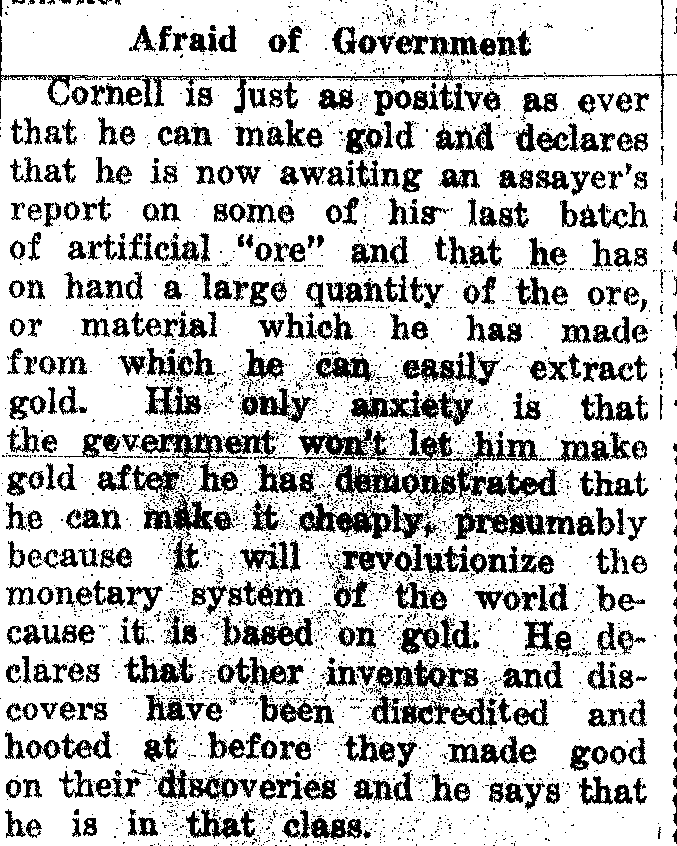
Afraid of Government
“Cornell is just as positive as ever that he can make gold and declares that he is now awaiting an assayer’s report on some of his last batch of artificial ‘ore’ and that he has on hand a large quantity of the ore, or material which he has made from which he can easily extract gold. His only anxiety is that the government won’t let him make gold after he has demonstrated that he can make it cheaply, presumably because it will revolutionize the monetary system of the world because it is based on gold. He declares that other investors and discoverers have been discredited and hooted at before they made good on their discoveries and he says that he is in that class.”
Coffee-O Extract Good
“Leaving his gold experiments aside he has really greatly improved his coffee substitute and has a good thing in that. He has interested Tacoma capital and it is being given a thorough trial. He now makes a liquid extract from the original ‘Coffee-O’ so that all that has to be done is to put a teaspoon of the extract into a cup of hot water and you have a very good coffee substitute. He says that he has changed his formula too somewhat and now makes four by products which will sell for enough to more than make the extract pure velvet. After making the extract he says that he can make from the residue ‘mapleine’ which is used to make an excellent imitation of maple sugar and syrup, a breakfast cereal and a salad oil, all of superior quality. He is apparently amply supplied with funds. He is here visiting the Hummel family.”
With the help of Robert Bailey’s North Pacific County Newspaper Index, 1889-1981 I was able to track down a bit more information on “Coffee-O” Cornell.
He was born Albert Kornelius, July 1, 1887 in the Bukovina region of the Austrian Empire to German parents. He arrived in the United States on Dec. 15, 1905 and within a short time unofficially changed his name to Albert Cornell. By 1910 he was living in Aberdeen, but then made his way to South Bend, where he set up a laboratory.
His “Coffee-O” product was patented in 1915 and apparently enjoyed some initial economic and critical success, buying him time to experiment with creating artificial gold.
But his activities frightened the neighbors. They complained about the toxic fumes, the noises, the explosions. Finally, in 1917, he was arrested and his operations shut down as a public nuisance. When he appeared before the City Council to argue his case, the debate became so heated one councilman invited Cornell to step outside where they could settle the matter with fists, but Coffee-O didn’t take the bait.
He lived in Tacoma throughout the 1920s. In Feb. 1928 he landed in the hospital as the result of a powerful explosion, a blast that destroyed his home and disfigured his person to some degree. He refused to divulge the purpose of his experiment.
Coffee-O Cornell appears in the Tacoma City Directory up to 1930 and then vanishes only to resurface in the 1940 census as a patient in Western State Hospital. He was an intriguing character who left us with a long trail of little mysteries.
Wednesday, January 2nd, 2013 Posted in Articles, Institutional Library Services | Comments Off on Dear Dewey from Western State Hospital
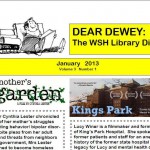 Dear Dewey January 2013 from Western State Hospital has arrived.
Dear Dewey January 2013 from Western State Hospital has arrived.
Monday, October 1st, 2012 Posted in Articles, Institutional Library Services | Comments Off on Dear Dewey Newsletter October 2012
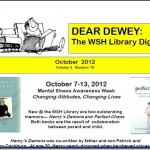 Check out the latest issue of Dear Dewey from Kathleen Benoun at Western State Hospital!!!
Check out the latest issue of Dear Dewey from Kathleen Benoun at Western State Hospital!!!
Tuesday, August 28th, 2012 Posted in Articles, Institutional Library Services | Comments Off on Western State Hospital Library takes a look at history
Kathleen Benoun at Western State Hospital Library has done it again. Not only does she keep the patients and staff happy in the library— her love of history has drawn her to help create the historical museum on the grounds of Washington State Hospital. Now that love of history and the library has combined to bring a great program to the hospital treatment centers. This program is a great addition to the library services at Western State Hospital. Check out the attached flyer to see how Kathleen showcases the hospital’s rich history.
Monday, October 3rd, 2011 Posted in Articles, Institutional Library Services | Comments Off on Small Hunch Pays Big Results!
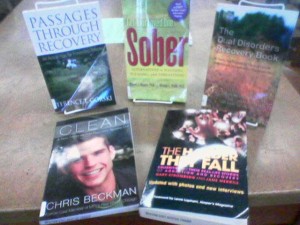 Some months ago, two ILS staff decided to write to some publishers of mental health resources and ask them about the possibility of receiving donated materials. National Recovery Month is every September and their collections were sadly depleted from the demand for such materials. They hoped that one or two of the companies might respond with an offer of a few donations. Much to their amazement and profound appreciation three companies responded within weeks of the letters being sent.
Some months ago, two ILS staff decided to write to some publishers of mental health resources and ask them about the possibility of receiving donated materials. National Recovery Month is every September and their collections were sadly depleted from the demand for such materials. They hoped that one or two of the companies might respond with an offer of a few donations. Much to their amazement and profound appreciation three companies responded within weeks of the letters being sent.
Hazelden and New Harbinger are outstanding publishers of educational and inspirational literature about substance abuse and recovery. Their products are consistently of the highest quality, and highly sought for library collections. Sounds True produces wonderful spoken word and music CDs for relaxation, meditation and health & healing. The gifts received from these generous companies resulted in dozens of books and several multiple CD sets. The cost to buy these materials would have been hundreds of dollars.
Western State Hospital immediately processed and published a “hot list” of the new Hazelden titles. The books started flying off the shelves within hours. Eastern State hospital patients will benefit from these gifts as well as staff who can use these resources for treatment groups. This bounty will also be shared among the other ILS branches either directly or through the ILL program.
Tuesday, September 20th, 2011 Posted in Articles, Institutional Library Services | Comments Off on Western State Hospital Museum Open-House
Ten years ago, I had a library visit from a hospital staffer who excitedly asked me to provide him information about the “dead people in the park.” Although I’ve received some odd questions during my years in the library of a state psychiatric hospital, this request was something unusual even for me. I suppressed a grin and asked him to give me more details. He told me he had stumbled upon a numbered stone during his lunch break walk in the park across the street from the hospital and was sure he had found the old patients cemetery of the hospital. I shrugged my shoulders and referred him to the campus historical expert. He left, and I thought that would be the end of talk about “dead people in the park.”
Not so. Two weeks later I received a call from my friend Laurel who invited me to attend a meeting after work about what to do about those “dead people in the park.” Now I was taken aback. Laurel is typically level-headed. She informed me that not only were there bodies in the park, there were over 3000 interred in a cemetery.Patients who lived and died at the “insane asylum” often had lost touch with their family members. The state bore the responsibility to bury their remains. Stigma about mental illness inspired lawmakers to stipulate that persons buried on site at a insane asylum must not name the deceased. Only a stone marker indicated the final resting place of somebody’s child, parent, relative.
More to follow….
Tuesday, June 21st, 2011 Posted in Articles, Institutional Library Services | Comments Off on 30 Years of Service to Western State Hospital
Kathleen is a wonderful storyteller with a patience that has served her well as the Library Associate at Western State Hospital. On June 15, 2011 Kathleen will become the longest working member of the Institutional Library Service team. 30 years of wonderful service was celebrated with a presentation of a certificate and award by State Librarian Rand Simmons.